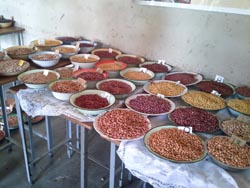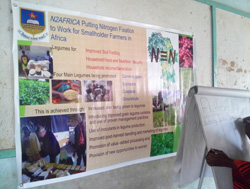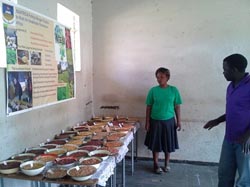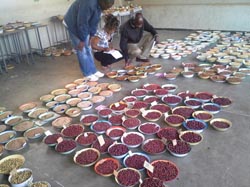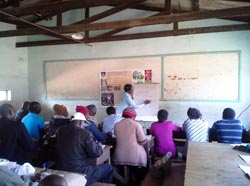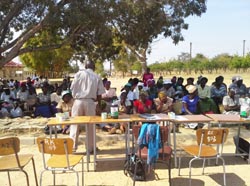During the period June-September, N2Africa activities in Zimbabwe focused on local level value addition of grain legumes through nutrition workshops that involved mostly women farmers and dissemination of project technologies at both ward and district agricultural shows, which are annual events. These activities were held in all the five districts where N2Africa is implementing activities, in line with N2Africa’s increased dissemination of technologies thrust. We intend to make the active participation of N2Africa at these annual district agricultural shows a key strategy of implementing the N2Africa D&D philosophy (Figure 1).
|
Figure 1. N2Africa beneficiaries were among some of the farmers who won at the ‘ward’ shows and subsequently brought their produce to the district agricultural shows during August |
Figure 2. Banners with the N2Africa message (left) were distributed to partners and attracted attention at agricultural shows as the message was coherent with the N2Africa exhibits (right)
|
|
Figure 3. ‘Judges’ assessing quality of grain legumes brought to the agricultural show by farmers in Makoni district |
For effective communication, we produced and distributed banners to all our key stakeholders in the districts (Figure 2). The banners attracted a lot of attention from farmers, NGO partners and government representatives at the agricultural shows. Two Members of Parliament attended one of the agricultural shows and we took the opportunity to explain to them the objectives of N2Africa. The Cluster Agricultural Development Services (CADS), a local NGO, has emerged as an important N2Africa partner implementing activities primarily in Goromonzi, Murehwa and Mutoko districts. During August and early September, we facilitated CADS to implement several nutrition workshops with farming communities. The workshops were structured at two stages: |
|
1. Formal ‘classroom type’ training of trainers (left picture below) involving community leaders, women groups leaders and local extension, and |
2. Stage 1 participants training more farmers in different villages, ensuring reaching out to hundreds of farmers.
|
We will report on the details of the recipes that farmers learnt during the next issue of Podcaster! We are now preparing for the next cropping cycle that normally starts late November.
Regis Chikowo

